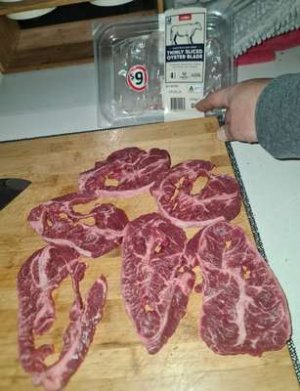This 'sneaky tactic’ by Coles outrages shoppers: ‘They are not making enough money’
By
Danielle F.
- Replies 21
In the bustling aisles of our local supermarkets, we expect to find quality products that match the value of our hard-earned dollars.
However, a recent incident at Coles left customers questioning the integrity of their purchases and the transparency of the retail giant's practices.
A disgruntled Coles customer voiced his frustration on social media over what he claims to be a deceptive practice by the supermarket chain.
'Brought this from Cessnock Coles the other day, and apparently they aren't making enough money from us that we are now getting reconstituted meat that's glued together Instead of what's labelled not happy Jan,' he wrote on a post.
The shopper's ire was directed at a pack of beef he purchased for $9.
Despite the packaging's assurance that the beef was 'always sourced from Australian farms', the shopper felt cheated, suggesting that Coles resorted to selling inferior meat products.
Reconstituted meat, also known as meat glue, is typically made by binding smaller pieces to create a seemingly whole piece.
While it can contain fewer fats and pigments, it's not what one would anticipate when purchasing a steak or a roast.
The post quickly sparked a debate within the community.
'You paid for a c*** cut of steak, and you got a c*** cut of steak... a lesser quality cut of beef,' one wrote.
'It's not glued. It's fat in the meat. It would be way more expensive to glue the meat together to the process line and do this than to sell it how it's cut,' another said.
'Instead of complaining on Facebook, why didn't you take the meat back to Coles?' a third asked.
A fourth suggested, 'Support local. Go to the butcher shop and this will be avoided.'
In the face of such controversy, it's essential to consider the broader implications of this incident for the community.
Consumers must be vigilant about where they shop and the quality of the products they bring into their homes.
Coles has responded to the backlash by reiterating its commitment to customer satisfaction and high-quality produce.
'We never add any binding ingredients to our fresh beef steaks. This pack of meat is not to our high-quality standards and should have been identified and graded out at production,' a Coles spokesperson shared.
'As always, we encourage customers to return any item they're not 100 per cent happy with to their nearest store for a full refund or replacement.'
 Have you encountered similar issues with supermarket produce? Please share your stories and thoughts with us in the comments section!
Have you encountered similar issues with supermarket produce? Please share your stories and thoughts with us in the comments section!
However, a recent incident at Coles left customers questioning the integrity of their purchases and the transparency of the retail giant's practices.
A disgruntled Coles customer voiced his frustration on social media over what he claims to be a deceptive practice by the supermarket chain.
'Brought this from Cessnock Coles the other day, and apparently they aren't making enough money from us that we are now getting reconstituted meat that's glued together Instead of what's labelled not happy Jan,' he wrote on a post.
The shopper's ire was directed at a pack of beef he purchased for $9.
Despite the packaging's assurance that the beef was 'always sourced from Australian farms', the shopper felt cheated, suggesting that Coles resorted to selling inferior meat products.
Reconstituted meat, also known as meat glue, is typically made by binding smaller pieces to create a seemingly whole piece.
While it can contain fewer fats and pigments, it's not what one would anticipate when purchasing a steak or a roast.
The post quickly sparked a debate within the community.
'You paid for a c*** cut of steak, and you got a c*** cut of steak... a lesser quality cut of beef,' one wrote.
'It's not glued. It's fat in the meat. It would be way more expensive to glue the meat together to the process line and do this than to sell it how it's cut,' another said.
'Instead of complaining on Facebook, why didn't you take the meat back to Coles?' a third asked.
A fourth suggested, 'Support local. Go to the butcher shop and this will be avoided.'
In the face of such controversy, it's essential to consider the broader implications of this incident for the community.
Consumers must be vigilant about where they shop and the quality of the products they bring into their homes.
Coles has responded to the backlash by reiterating its commitment to customer satisfaction and high-quality produce.
'We never add any binding ingredients to our fresh beef steaks. This pack of meat is not to our high-quality standards and should have been identified and graded out at production,' a Coles spokesperson shared.
'As always, we encourage customers to return any item they're not 100 per cent happy with to their nearest store for a full refund or replacement.'
Key Takeaways
- A Coles customer accused the supermarket of selling reconstituted meat at their Cessnock store.
- The shopper expressed his dissatisfaction on social media and shared a photo of beef steaks with large holes.
- Social media users had mixed reactions, with some defending the supermarket and suggesting that the meat was not glued but a lower-quality cut.
- In response to the complaint, Coles stated that they do not add binding ingredients to their fresh beef steaks and encouraged customers to return any unsatisfactory items for a refund or replacement.








